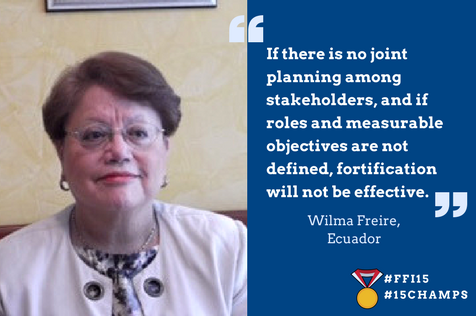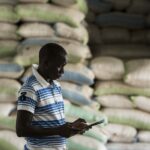Research Professor at Universidad San Francisco de Quito in Ecuador

FFI: What inspired you to become involved with food fortification?
Freire: The first experience that I learned about was the successful program to eliminate endemic goiter in Ecuador through fortification of salt with iodine. Thanks to this intervention, Ecuador eliminated iodine deficiency nationwide and had a sustainable impact in time. From the beginning, this program was designed as an inter-sectorial intervention, in which each sector assumed an active role with specific activities and tasks, and in which the community was also an active partner from the beginning. In its design and implementation, the program benefitted from the participation of all stakeholders, having procured complete commitment to eliminating endemic goiter.
FFI: How is your country prioritizing fortification?
Freire: Two mass fortification programs are currently being implemented. One is iodized salt and the other is the fortification of wheat flour with iron and folic acid. Iodine and iron deficiencies were measured in the 2014 national survey (ENSANUT-ECU). The data show that with respect to iodine, there is complete coverage with iodized salt and it is even necessary to closely monitor this—not only the direct consumption of salt, but rather an excess of iodine that could be affecting a certain segment of the population. With regard to the fortification of wheat flour and the increased consumption of ultra-processed foods that contain iron and other nutrients, there has been an impact in the levels of hemoglobin. We have observed a reduction in the prevalence of anemia in the population of adult women, but not in children under the age of five.
FFI: What are the main components to a successful fortification program where you live?
Freire: From the beginning, an intervention should be planned in such way that the roles of the State, the private sector, and other stakeholders—including the target population–are defined with absolute clarity and commitment. The State is responsible for regulating and controlling the process. Therefore, it should define what activities will be carried out, with which resources and infrastructure, and how process and impact evaluations should be conducted. The State should also identify the appropriate vehicle, taking into consideration not only the problem of nutritional deficit, but also the implications that it could have in other nutritional problems, especially overweight and obesity.
On the other hand, the private sector is responsible for implementing the fortification of the selected product and guaranteeing quality control in the process of fortification. The private sector should guarantee that the product will reach the target population in optimal condition and timely fashion through commercialization and distribution channels. In addition, the private sector is responsible for assuring the timely availability of the substance with which the appropriate vehicle is to be fortified.
FFI: What are the greatest challenges you have encountered in planning or implementing fortification programs? And how did you address those challenges?
Freire: Securing sustainable collaboration among the State, the international community, the private sector, and civil society is particularly challenging. It is important that fortification programs respond to the particular conditions in each country and that they be conducted in conjunction with the State.
FFI: What can we do, as a society, to continue raising the fortification efforts?
Freire: It is import that these efforts be designed, planned, implemented–when appropriate– along with other interventions, including programs designed to promote the production and consumption of healthy, locally-produced foods.


